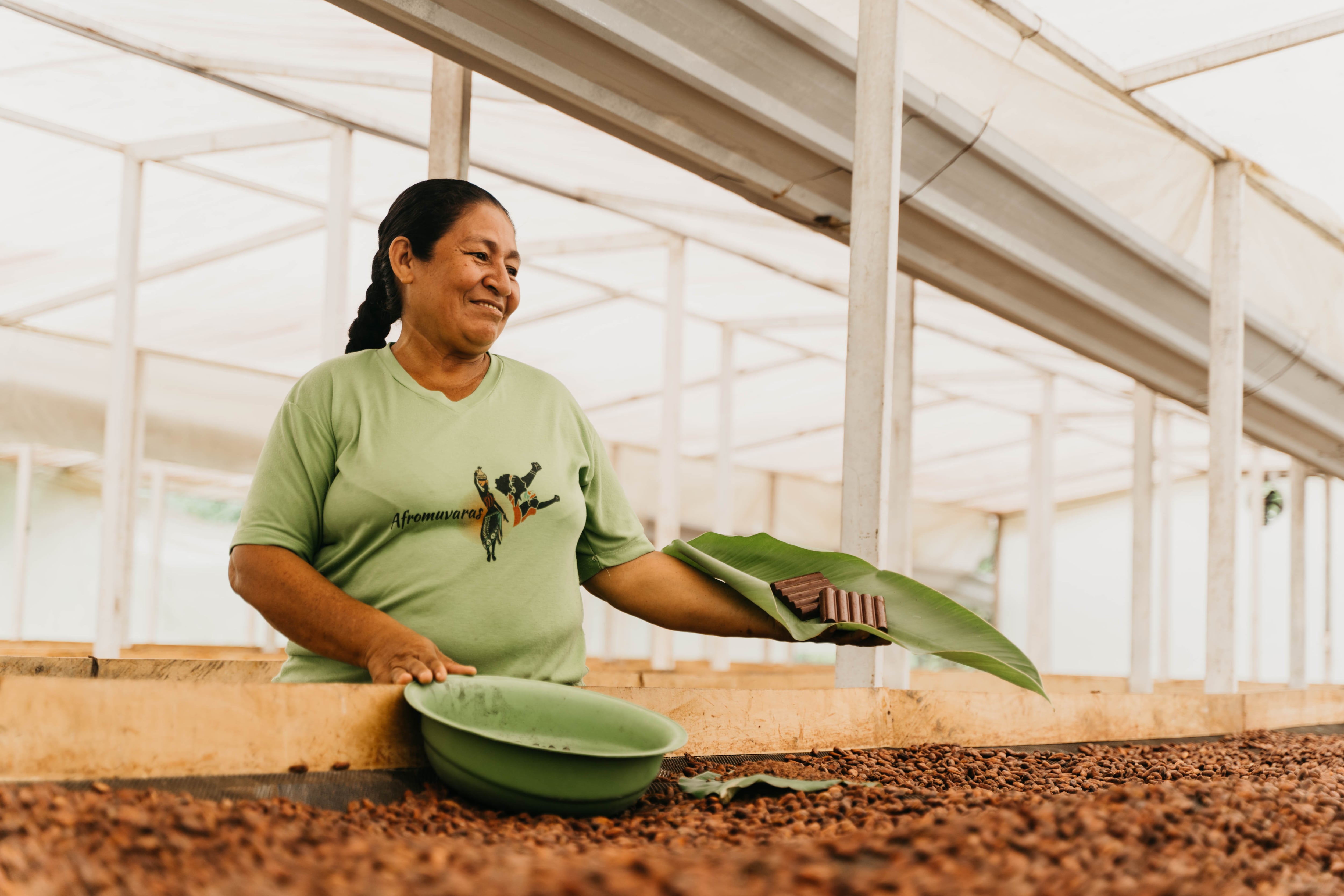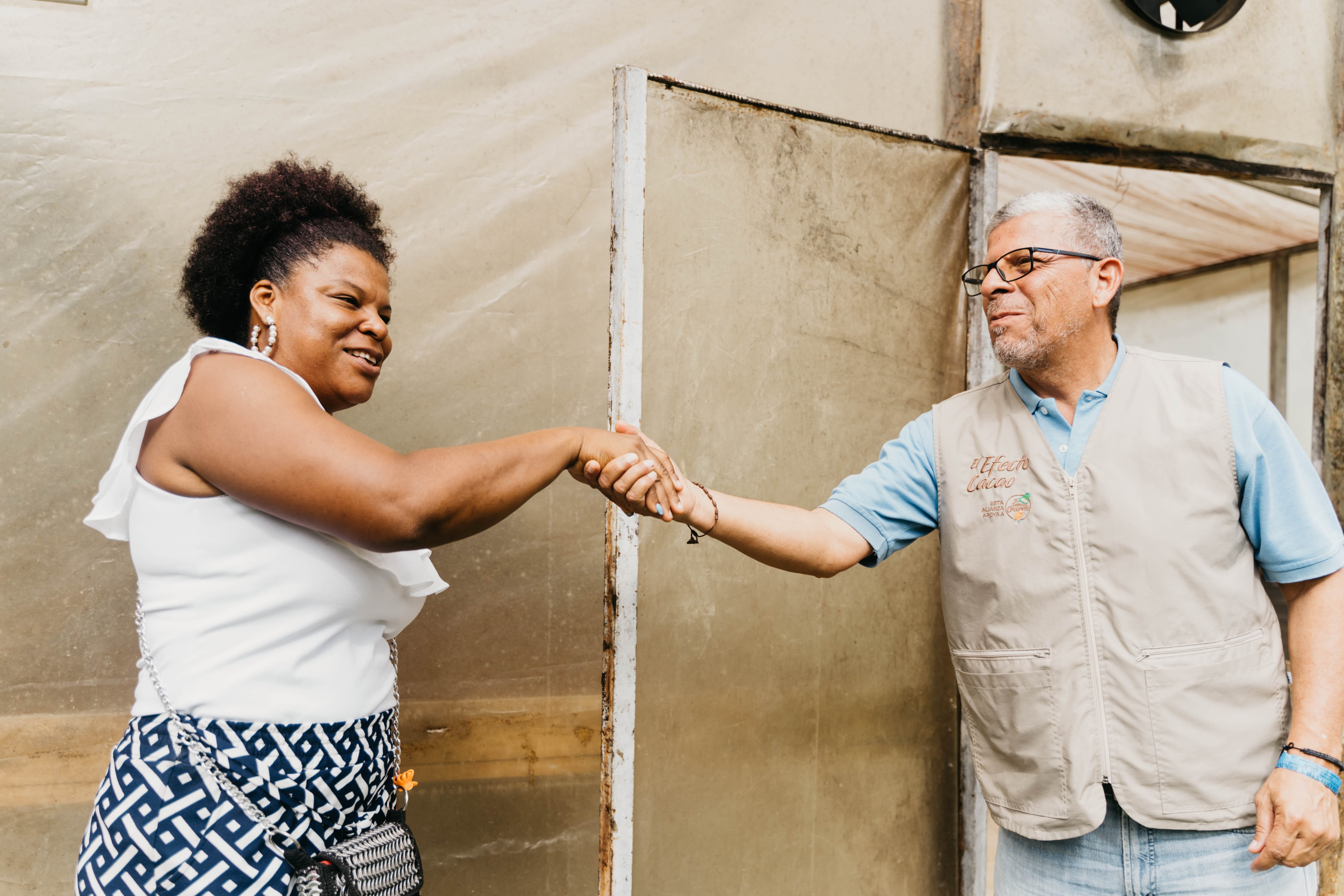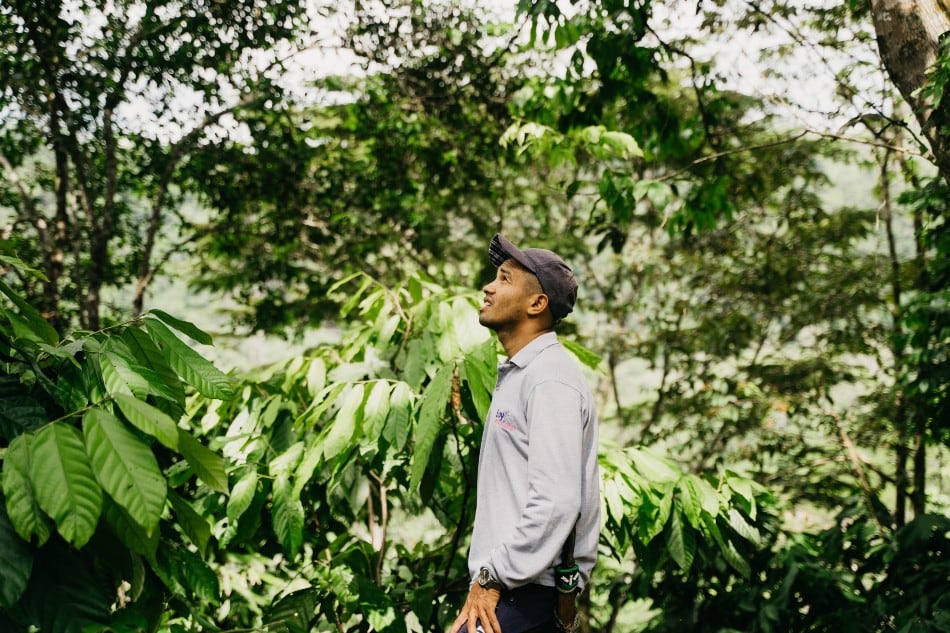For Marlene, who lived in a particularly violent area in rural Colombia, cocoa transformed her life almost overnight. When her husband was kidnapped and she was forced to pay the ransom, she was left with crippling debt. With only a small piece of land she’d inherited from her father in Santa Rosa del Sur, Marlene planted three hectares of cocoa and has since been able to financially support her family through safe and legal trade. She has two daughters and a son, all of whom now have bachelor’s degrees.
A ‘crop for peace’
The reality remains that a small farmer who is very isolated in a remote countryside has limited options to develop a steady income. The best legal option is cacao: a non-perishable commodity grown from a very strong tree, native to the region.

Agronomically, both the illicit crop coca and cocoa require the same altitude and growing conditions to thrive – between 0-1000 meters above sea-level and a tropical microclimate with high humidity and temperatures. Comparatively, coffee, one of Colombia’s other largest exports, is grown at far higher altitudes, meaning it isn’t a suitable alternative for farmers in coca-producing areas.
Because of its potential to reduce violence and deforestation, cocoa was designated a ‘crop for peace’ by the Colombian government. Helping farmers transition to cocoa farming is now one of our biggest challenges at Luker Chocolate – but also our greatest opportunity. As a productive and viable alternative to illicit crops, cocoa can offer rural communities with greater financial stability, educational infrastructure, and most importantly, peace and harmony.
Driving economic empowerment
Cocoa cultivation offers a pathway to economic empowerment for communities previously affected by conflict. Through cocoa, farmers can break the cycle of poverty and gain financial agency, taking ownership of their own sourcing and pricing.
The Colombian cocoa market is ripe for the picking; cacao is in high global demand, and according to the CBI, the global market will average an annual rate of almost 6.8% between 2021 and 2028. Though we currently rank tenth globally in total cocoa output, we’re fifth for exports of fine-flavour cocoa, and climbing. In fact, Colombian cocoa exports have increased by over 400 percent since 2011, a sign that many more farmers are taking up the craft in search of peace.
However, any form of farming does require an upfront financial investment. Cocoa is no different. When communities are struggling to make ends meet, the cost of new equipment, seedlings and fertilisers can be enough to prevent farmers from growing different crops. That’s why cocoa manufacturers, governmental bodies and international organisations have set out to support farmers in setting up new cocoa farms. The payoff is huge; farmers are equipped with the tools they need to establish a thriving cocoa business that helps to fuel the local economy and establish peace and prosperity.
When farmers are just starting out, and in periods of uncertainty or change, it’s especially important for manufacturers to guarantee purchase of cocoa producers’ beans – regardless of quality, size or variety. Though we pay a premium for high-quality product, we’re invested in the farmers just as much as we are the product and guarantee a fair price for all beans produced. We know how crucial it is that they have financial stability, which is why we also provide training on how to maximise yield and increase quality – to ensure every family is renumerated for their efforts.
But it’s not just about paying producers well or consistently. It’s also about helping farmers – and others in the community – to diversify their income streams, which builds resilience against supply chain pressures, climate change and other factors too. We encourage participants in The Chocolate Dream, our collaborative sustainability plan, to embark on courses on entrepreneurship and financial independence, to encourage creativity and sustainable income growth outside of solely farming.
Fostering social cohesion
Cocoa cultivation isn’t a solo endeavour – it requires collaboration, meaning there’s often a number of people working on any one farm. This helps to drive the population back to rural areas, mitigating the impact of urban migration and increasing employment opportunities within deprived communities. This isn’t just supported anecdotally, either, as World Resources Institute found that employment rates have increased by those looking to move away from conflict and gain work on cocoa farms.
As more people enter rural communities, there is greater safety to explore wider career opportunities, set up local law enforcement, and increase attendance and engagement in schools. In Colombia, since cocoa is a legal soft commodity with a transparent and traceable supply chain, the industry is held more accountable, meaning welfare checks are mandatory, and we’re able to monitor the number of local children in school.

What’s more, it means we can enrich educational systems and target at-risk children with specialised programs. In Tumaco, for example, the illiteracy rate is significantly higher than the national average at 17%. And, until recently, only 26% of children that start primary school went on to complete secondary education, meaning young people here were more likely to engage in violent and illegal activities. But through cocoa and with the help of local partners Fundación Luker and Global Humanitaria, we’re currently providing schools with access to specialised teaching methodology, thus improving literacy rates, educational outcomes and social cohesion.
Collaboration for change
Both economic and community development is only secured in remote areas through collaboration. If governments cannot access certain communities, there is a higher chance of illegal activity. However, through collaboration with cocoa manufacturers that buy cocoa, local organisations and international development agencies, these areas can transition to cocoa peacefully.
Take the extremely remote area of Guerima, for example. With no roads, community facilities or proper infrastructure, the closest town is over four hours away by truck. For producers here, it was a real challenge to transport cocoa from the region to the nearest manufacturing plant, meaning they weren’t able to sell their crops efficiently. Through our collaborative effort with The Colombian Air Force, all cocoa from this region is now transported by The Air Force Airplanes – meaning farmers don’t have to factor the cost of transport into the price of their cocoa.
Collaboration with international organisations is also instrumental in restoring peace too; USAID is researching cocoa as a tool for peace through its own project. USAID is helping to fund research and projects to spread cocoa production in Colombia, supplanting coca production and sustaining peace in these communities. Around 80,000 hectares is currently supported by the government, institutions and even other countries.
Through the remarkable journey of cocoa, we see lives transformed, communities empowered, and the land healing. With the ongoing support and dedication of various actors throughout the value chain, cocoa continues to weave a story of hope and progress in Colombia, bringing peace and prosperity to all those touched by its remarkable journey.
Julia Ocampo is Director of Sustainability, Luker Chocolate

